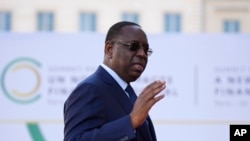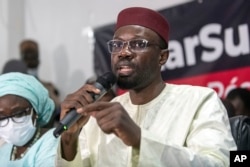Internet shutdowns, a TikTok ban and journalist arrests show a downward trend in press freedom in Senegal, a country once hailed as an example of "democratic success."
Press freedom advocates and journalists working in the West African country say the decline comes amid mass protests over the arrest of a key opposition figure and ahead of elections scheduled for early 2024.
"Once a beacon of press freedom, the country's reputation has been tarnished by many factors, the most important of which being the multiplication of threats of physical and verbal violence from political actors," Sadibou Marong, West Africa director of media watchdog Reporters Without Borders told VOA.
Between April 2022 and August 2023 his organization recorded at least 20 violations against journalists "with various level(s) of atrocity, including unlawful arrests, attacks and judicial persecution."
Those incidents, "as well as the suspension of mobile phone internet access and the ban on TikTok, fuel concern about a decline in press freedom in Senegal," the Dakar-based advocate said.
One of the most high-profile cases is that of Pape Alé Niang, an investigative journalist and director of news website Dakar Matin, who has been sent to jail three times in less than a year.
More recently, police in Dakar on Tuesday detained reporter Abdou Khadre Sakho on accusations of false news for coverage of the detained opposition leader Ousmane Sonko, said the Committee to Protect Journalists.
Niang’s apparent crime: "instigating an insurrection" after broadcasting a live video about the jailed opposition politician.
When he spoke with VOA via a messaging app, Niang was in a hospital after staging a hunger strike to protest being taken into custody in July.
"For this last arrest, the objective was still to silence me. As soon as I was arrested I started a hunger strike, after seven days I was evacuated to the hospital," he said.
Niang believes the government of President Macky Sall is "drifting towards becoming dictatorial."
A spokesperson for the Interior Ministry referred VOA to the Justice Ministry. As of publication, the ministry had not responded to the request for comment.
Niang is not the only journalist to face legal action.
Two journalists were detained in May. One of those — Maty Sarr Niang — is still in detention, said the Committee to Protect Journalists.
And authorities detained Pape Ndiaye, a reporter for Walf TV, from March until June, over accusations of false news. They also suspended the privately owned broadcaster for a month in June over its coverage of protests.
For other journalists in Senegal, the recent actions have left some feeling cautious.
Mady Camara, a freelancer who writes for the New York Times among other publications, said that while he personally has not faced any issues, "Journalists don't feel free to write about any topic.”
"It's a little bit tricky for journalists to work freely without feeling threatened," he said.
Camara said the decline in the media environment had come as a surprise to many, as Sall had been considered an advocate of democracy in the region.
He pointed to the "remarkable" change in Senegal's annual press freedom ranking by Reporters Without Borders. In 2021 the country ranked 49 out of 180 countries where 1 marks the best environment. But in 2023, it had fallen 55 places to 104 on the annual index.
The Media Foundation for West Africa said in an August statement that it was "deeply concerned by these events in Senegal, a country otherwise celebrated as an example of democratic success in Africa."
Borso Tall, who contributes to media including the BBC, said not only can the law be used to punish those who oppose the government, it can also be used to punish anyone who simply reports on its critics.
"Press freedom is always attacked when change is about to happen," she said. But, Tall noted, what's happening right now "is unprecedented, and it goes against everything that we know about Senegal."
Many press organizations and journalists believe the popularity of the opposition party, violent protests, and the media's coverage of both account for the apparent change.
Late last month the government dissolved the PASTEF party led by outspoken Sall critic Sonko, who is facing charges that include plotting an insurrection.
Against that backdrop, access to the internet has been cut and authorities have ordered access to be blocked to some social media platforms.
The global #KeepItOn coalition, which fights internet shutdowns, has called on Senegal's government to end the blackouts.
"Internet shutdowns are never a necessary or proportionate response to public unrest. The government of Senegal must immediately end the ongoing escalation of internet shutdowns and refrain from flipping the kill switch whenever they feel like it," the group said.
Also in August, the government ordered the video-sharing platform TikTok to be blocked, citing "hateful and subversive messages."
Others believe it is because of content focused on the protests.
Even with the block in place, journalist Tall said, young Senegalese find ways to get around it.
"If local people cannot share what's happening, they'll still film it and share it later when they have internet or VPN," she said.
As for Dakar Matin director Niang, speaking from a hospital, he told VOA he is undeterred, saying, "I will continue my work once my health is restored."





